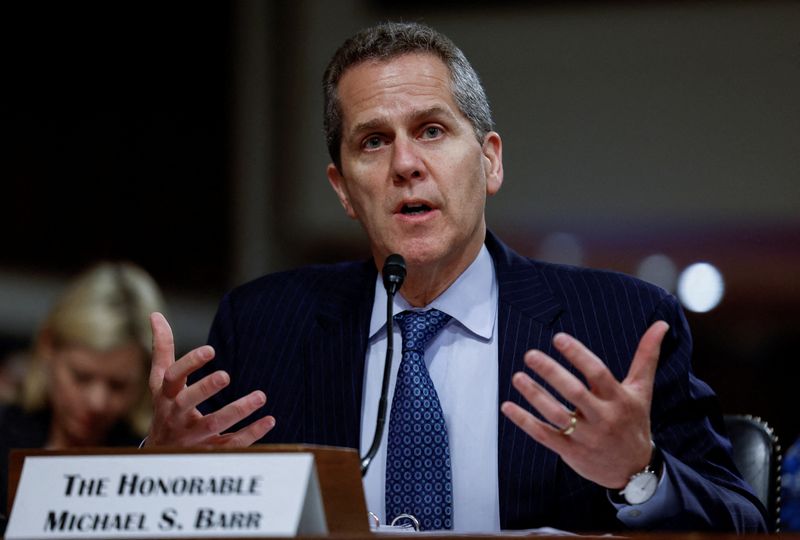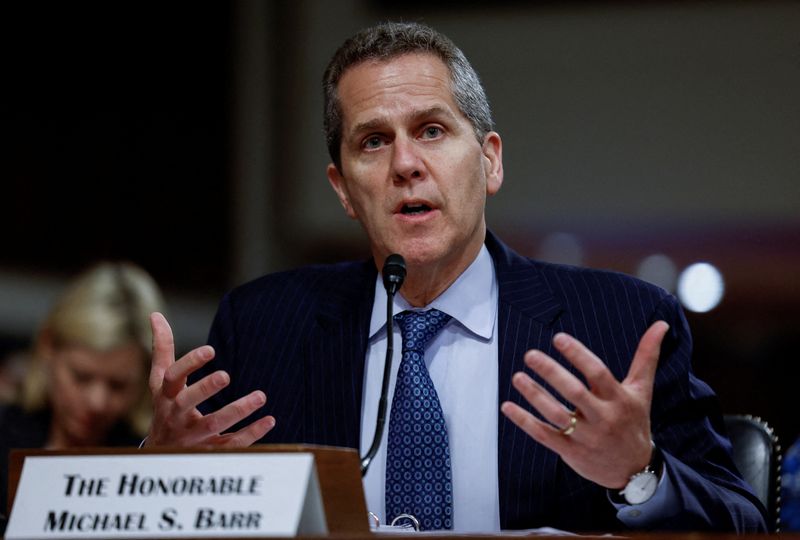Economy
US bank regulators to be grilled by Congress on capital hike plan


© Reuters. FILE PHOTO: Federal Reserve Board Vice Chair for Supervision, Michael Barr, testifies before a Senate Banking, Housing, and Urban Affairs Committee hearing in the wake of recent bank failures, on Capitol Hill in Washington, U.S., May 18, 2023. REUTERS/Eve
By Pete Schroeder and Michelle Price
WASHINGTON (Reuters) -The Federal Reserve’s top Wall Street cop Michael Barr and other bank regulators defended plans to hike U.S. bank capital requirements before Congress on Tuesday as they face increasing pressure from many lawmakers to rein in their efforts.
Barr, the Federal Deposit Insurance Corporation’s Martin Gruenberg and acting Comptroller of the Currency Mike Hsu appeared before the Senate Banking Committee for the first time since proposing the “Basel III Endgame” rules in July.
The proposal would overhaul how banks gauge risk and, in turn, how much capital they must hold against potential losses.
Regulators say stronger cash cushions will make the financial system safer and are especially crucial after three banks failed earlier this year. But lenders have attacked the proposal, saying it will hurt lending and the broader U.S. economy.
As part of their campaign to kill the Basel proposal, banks have been lobbying lawmakers to put pressure on the regulators. On Monday, 39 Senate Republicans stepped up the pressure, asking the regulators to scrap the proposal, citing economic harm, and quickly raised the issue again on Tuesday.
“You have failed to consider how these rules will impact banks and businesses of all sizes, ultimately harming the American people,” Senator Mike Rounds, a Republican, told officials.
“Banks will now spend their time complying with more Washington bureaucratic red tape instead of investing that time or resources into their local communities.”
Some Democrats, however, urged the agencies to hold firm against industry criticism and complete the rules, which were first envisaged following the 2007-2009 global financial crisis.
“These capital rules represent the final and long, long overdue plank in the post-financial crisis overhaul,” said Senator Sherrod Brown, who chairs the panel.
“I hope you’ll see these arguments for what they really are, the same old Wall Street whining, and that you’ll deliver a strong capital rule.”
Analysts and lobbyists will be watching closely on Tuesday to ascertain where more moderate Democrats like Senators Mark Warner of Virginia and Jon Tester of Montana stand on the issue.
“The most important voices during this hearing will be centrist Democrats, as their tone and tenor will impact both the comments from industry and the Fed’s response to those comments in a final rulemaking,” said Isaac Boltansky, director of policy research for brokerage BTIG.
Gruenberg may also be pressed on a Wall Street Journal report that said female employees had left the regulator due to its “toxic” culture and that misconduct was not punished.
Republicans on the House of Representatives Financial Services Committee said on Tuesday they were calling for an urgent briefing from the FDIC on the allegations.
In his opening remarks before the Senate committee, Gruenberg said he was “personally disturbed” by the report and has hired an external firm to conduct a thorough review.
“I have no higher priority than to ensure all FDIC employees work in a safe environment where they feel respected,” he said.
Officials may also be queried about a ransomware attack on the U.S. arm of China’s biggest lender, the Industrial and Commercial Bank of China, which disrupted trades in the $26 trillion U.S. Treasury market on Thursday.
Economy
Russian central bank says it needs months to make sure CPI falling before rate cuts -RBC


© Reuters. Russian Central Bank Governor Elvira Nabiullina attends a news conference in Moscow, Russia June 14, 2019. REUTERS/Shamil Zhumatov/File Photo
MOSCOW (Reuters) – Russia’s central bank will need two to three months to make sure that inflation is steadily declining before taking any decision on interest rate cuts, the bank’s governor Elvira Nabiullina told RBC media on Sunday.
The central bank raised its key interest rate by 100 basis points to 16% earlier in December, hiking for the fifth consecutive meeting in response to stubborn inflation, and suggested that its tightening cycle was nearly over.
Nabiullina said it was not yet clear when exactly the regulator would start cutting rates, however.
“We really need to make sure that inflation is steadily decreasing, that these are not one-off factors that can affect the rate of price growth in a particular month,” she said.
Nabiullina said the bank was taking into account a wide range of indicators but primarily those that “characterize the stability of inflation”.
“This will take two or three months or more – it depends on how much the wide range of indicators that characterize sustainable inflation declines,” she said.
The bank will next convene to set its benchmark rate on Feb. 16.
The governor also said the bank should have started monetary policy tightening earlier than in July, when it embarked on the rate-hiking cycle.
Economy
China identifies second set of projects in $140 billion spending plan


© Reuters. FILE PHOTO: Workers walk past an under-construction area with completed office towers in the background, in Shenzhen’s Qianhai new district, Guangdong province, China August 25, 2023. REUTERS/David Kirton/File Photo
SHANGHAI (Reuters) – China’s top planning body said on Saturday it had identified a second batch of public investment projects, including flood control and disaster relief programmes, under a bond issuance and investment plan announced in October to boost the economy.
With the latest tranche, China has now earmarked more than 800 billion yuan of its 1 trillion yuan ($140 billion) in additional government bond issuance in the fourth quarter, as it focuses on fiscal steps to shore up the flagging economy.
The National Development and Reform Commission (NDRC) said in a statement on Saturday it had identified 9,600 projects with planned investment of more than 560 billion yuan.
China’s economy, the world’s second largest, is struggling to regain its footing post-COVID-19 as policymakers grapple with tepid consumer demand, weak exports, falling foreign investment and a deepening real estate crisis.
The 1 trillion yuan in additional bond issuance will widen China’s 2023 budget deficit ratio to around 3.8 percent from 3 percent, the state-run Xinhua news agency has said.
“Construction of the projects will improve China’s flood control system, emergency response mechanism and disaster relief capabilities, and better protect people’s lives and property, so it is very significant,” the NDRC said.
The agency said it will coordinate with other government bodies to make sure that funds are allocated speedily for investment and that high standards of quality are maintained in project construction.
($1 = 7.1315 renminbi)
Economy
Russian central bank says it needs months to make sure CPI falling before rate cuts -RBC


© Reuters. Russian Central Bank Governor Elvira Nabiullina attends a news conference in Moscow, Russia June 14, 2019. REUTERS/Shamil Zhumatov/File Photo
MOSCOW (Reuters) – Russia’s central bank will need two to three months to make sure that inflation is steadily declining before taking any decision on interest rate cuts, the bank’s governor Elvira Nabiullina told RBC media on Sunday.
The central bank raised its key interest rate by 100 basis points to 16% earlier in December, hiking for the fifth consecutive meeting in response to stubborn inflation, and suggested that its tightening cycle was nearly over.
Nabiullina said it was not yet clear when exactly the regulator would start cutting rates, however.
“We really need to make sure that inflation is steadily decreasing, that these are not one-off factors that can affect the rate of price growth in a particular month,” she said.
Nabiullina said the bank was taking into account a wide range of indicators but primarily those that “characterize the stability of inflation”.
“This will take two or three months or more – it depends on how much the wide range of indicators that characterize sustainable inflation declines,” she said.
The bank will next convene to set its benchmark rate on Feb. 16.
The governor also said the bank should have started monetary policy tightening earlier than in July, when it embarked on the rate-hiking cycle.

 Forex2 years ago
Forex2 years agoForex Today: the dollar is gaining strength amid gloomy sentiment at the start of the Fed’s week

 Forex2 years ago
Forex2 years agoHow is the Australian dollar doing today?

 Forex1 year ago
Forex1 year agoUnbiased review of Pocket Option broker

 Forex2 years ago
Forex2 years agoDollar to pound sterling exchange rate today: Pound plummeted to its lowest since 1985

 Cryptocurrency2 years ago
Cryptocurrency2 years agoWhat happened in the crypto market – current events today

 World2 years ago
World2 years agoWhy are modern video games an art form?

 Stock Markets2 years ago
Stock Markets2 years agoMorgan Stanley: bear market rally to continue

 Economy2 years ago
Economy2 years agoCrude oil tankers double in price due to EU anti-Russian sanctions

































